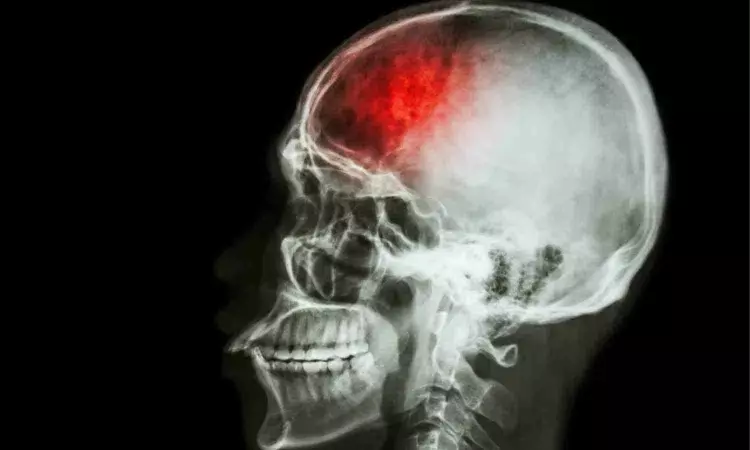- Home
- Medical news & Guidelines
- Anesthesiology
- Cardiology and CTVS
- Critical Care
- Dentistry
- Dermatology
- Diabetes and Endocrinology
- ENT
- Gastroenterology
- Medicine
- Nephrology
- Neurology
- Obstretics-Gynaecology
- Oncology
- Ophthalmology
- Orthopaedics
- Pediatrics-Neonatology
- Psychiatry
- Pulmonology
- Radiology
- Surgery
- Urology
- Laboratory Medicine
- Diet
- Nursing
- Paramedical
- Physiotherapy
- Health news
- Fact Check
- Bone Health Fact Check
- Brain Health Fact Check
- Cancer Related Fact Check
- Child Care Fact Check
- Dental and oral health fact check
- Diabetes and metabolic health fact check
- Diet and Nutrition Fact Check
- Eye and ENT Care Fact Check
- Fitness fact check
- Gut health fact check
- Heart health fact check
- Kidney health fact check
- Medical education fact check
- Men's health fact check
- Respiratory fact check
- Skin and hair care fact check
- Vaccine and Immunization fact check
- Women's health fact check
- AYUSH
- State News
- Andaman and Nicobar Islands
- Andhra Pradesh
- Arunachal Pradesh
- Assam
- Bihar
- Chandigarh
- Chattisgarh
- Dadra and Nagar Haveli
- Daman and Diu
- Delhi
- Goa
- Gujarat
- Haryana
- Himachal Pradesh
- Jammu & Kashmir
- Jharkhand
- Karnataka
- Kerala
- Ladakh
- Lakshadweep
- Madhya Pradesh
- Maharashtra
- Manipur
- Meghalaya
- Mizoram
- Nagaland
- Odisha
- Puducherry
- Punjab
- Rajasthan
- Sikkim
- Tamil Nadu
- Telangana
- Tripura
- Uttar Pradesh
- Uttrakhand
- West Bengal
- Medical Education
- Industry
In ischaemic stroke, Tenecteplase tied to better recovery and reduced disability than alteplase: Study

For people with ischemic stroke, treatment with the clot-busting drug tenecteplase is associated with a slightly higher likelihood of an excellent recovery and reduced disability three months later than the drug alteplase, according to a meta-analysis published in the October 16, 2024, online issue of Neurology®, the medical journal of the American Academy of Neurology. Researchers found that the likelihood of good recovery was similar between the two treatments.
Ischemic stroke is caused by a blockage of blood flow to the brain and is the most common type of stroke.
Alteplase is the only drug approved by the U.S. Food and Drug Administration (FDA) for ischemic stroke. Tenecteplase, a newer clot-busting drug, is approved for treatment of ischemic stroke in Europe but not in the U.S. It is approved in the U.S. for treating clots blocking coronary arteries and is used off-label for ischemic stroke at some stroke centers.
“When a person has an ischemic stroke, they may be treated with either tenecteplase or alteplase,” said study author Georgios Tsivgoulis MD, PhD, MSc, of the National and Kapodistrian University of Athens in Greece and a Fellow of the American Academy of Neurology. “While treatment with either drug increases the chances of a good recovery after stroke, we found people who were given tenecteplase were more likely to have an excellent recovery.”
For the meta-analysis, researchers reviewed 11 studies that compared the safety and efficacy of treatment with tenecteplase or alteplase within four-and-a-half hours after having a stroke. In those studies, 3,788 people were treated with tenecteplase and 3,757 people were treated with alteplase.
Researchers examined participants’ recovery after three months. They used a scale with a score of zero to six where zero represents no symptoms and six represents death. An excellent recovery was defined as a score of zero to one where one represents no significant disability despite some symptoms. A good recovery was defined as a score of zero to two where two represents slight disability when someone is unable to do all previous tasks but can take care of themselves without help. Reduced disability was defined as a drop of one point or more on the scale at three months.
Researchers found people who were given tenecteplase had a 5% higher likelihood of excellent recovery than people who were given alteplase, as well as a 10% higher likelihood of reduced disability three months after stroke. The chances of a good recovery were similar for both groups.
“Our meta-analysis shows that while both drugs have similar safety and increase the chances of good recovery after stroke, tenecteplase is superior to alteplase with a greater chance of excellent recovery and reduced disability,” said Tsivgoulis. “Our findings support using tenecteplase over alteplase when treating people for ischemic stroke.”
A limitation of the meta-analysis was that while it looked at all available randomized-controlled clinical trials on tenecteplase and alteplase, three of the 11 studies were presented at scientific conferences but not yet published in a scientific journal.
Reference:
Lina Palaiodimou, Aristeidis H. Katsanos, Guillaume Turc, Alexandros-Georgios Asimakopoulos, and Georgios Tsivgoulis,Tenecteplase vs Alteplase in Acute Ischemic Stroke Within 4.5 Hours A Systematic Review and Meta-Analysis of Randomized Trials, Neurology, https://doi.org/10.1212/WNL.0000000000209903.
Dr Kamal Kant Kohli-MBBS, DTCD- a chest specialist with more than 30 years of practice and a flair for writing clinical articles, Dr Kamal Kant Kohli joined Medical Dialogues as a Chief Editor of Medical News. Besides writing articles, as an editor, he proofreads and verifies all the medical content published on Medical Dialogues including those coming from journals, studies,medical conferences,guidelines etc. Email: drkohli@medicaldialogues.in. Contact no. 011-43720751


